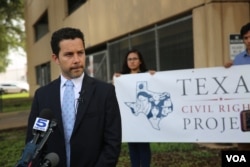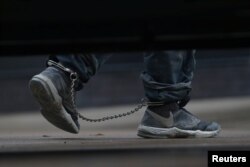Days after the Trump administration reversed a policy of separating migrant families at the U.S.-Mexico border, no parents were being criminally prosecuted for the misdemeanor of illegal entry, immigration advocates told reporters outside the McAllen,Texas courthouse.
Texas Civil Rights Project attorney Efren Olivares said it "appears to be a change" from what has been happening in recent days.
"There wasn't a single person who said 'I'm a father or I'm a mother who has been separated from my child,'" Olivares related.
The Texas Civil Rights Project attorneys and volunteers have been gathering information from those separated from their children since May 25 and have interviewed more than 380 parents. They plan to come back to court Monday to continue their work.
Still, there were people who had been separated from underage relatives in the courtroom Friday. Olivares said there were two brothers who had been separated from their siblings, and there was a cousin who had been separated from a younger cousin.
Olivares said adults at court Friday had been arrested about two days ago and appeared in court in chains, handcuffed and in shackles.
A day earlier, immigration attorneys and advocates in the courtroom were surprised to hear that cases had been dropped against parents charged with the misdemeanor of illegal entry.
The federal public defender's office for the region that covers cases from El Paso to San Antonio told the Associated Press the U.S. Attorney's Office would be dismissing cases where parents were charged with illegally entering or re-entering the country and were subsequently separated from their children.
Detained together
"Going forward, they will no longer bring criminal charges against a parent or parents entering the United States if they have their child with them," Maureen Scott Franco, the federal public defender for the Western District of Texas, wrote in an email.
The move would allow parents and children to be detained together, as specified by Trump in Wednesday's executive order. Children may not be incarcerated with parents who have been criminally charged. But it also flies in the face of the administration's "zero-tolerance" policy that says people who cross the border illegally should be criminally charged.
The Department of Justice has said it is not dropping charges against detained immigrants, and DOJ lawyers Thursday asked a federal judge in California for an emergency ruling — an attempt to overturn a decades-old settlement — that would allow them to detain minors with their legal guardians until their immigration cases are adjudicated.
Currently, authorities can only hold families in immigration detention for 20 days. On average, current cases are taking 721 days to resolve.
Although the U.S. government is apparently changing procedures to accommodate President Donald Trump's move to stop separating families at the border, it is unclear how more than 2,300 children or so will return to parents.
















